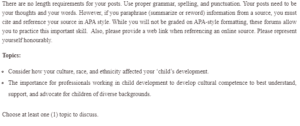Child Development
Cultural competence is the ability to interact effectively with people of different cultural backgrounds, understand their beliefs, values, and behaviours, and use this knowledge to provide more effective services. As a child, my culture, race, and ethnicity all affected my development and self-identity. Growing up in a mixed-race family, I was exposed to different cultures and perspectives early on. This helped me appreciate the diversity in my own life and the lives of those around me.
It is important for professionals working in child development fields to develop cultural competence to best understand, support, and advocate for children of diverse backgrounds. Research has shown that cultural values, beliefs, and traditions can significantly impact a child’s development. For example, a study by A. J. Sousa and E. S. Delgado (2020) found that the traditional values of Mexican American families, such as familism and respect for elders, can lead to better outcomes for children. Additionally, research has shown that family language(s) can indicate a child’s academic success. A study by G. J. Contreras et al. (2019) found that bilingual children had higher levels of academic achievement than those who only spoke one language. Furthermore, research has shown that Socioeconomic status (SES), poverty, immigration, prejudice, and discrimination can all impact a child’s development. For example, a study by J. M. Kaufman et al. (2021) found that children from low-income households are more likely to experience poorer educational outcomes due to limited access to resources.
As a Psychologist consulting on child development policymaking, my two recommendations for advancing equity for children of diverse backgrounds would be to prioritize the provision of resources and to focus on early intervention strategies. Children of diverse backgrounds need access to resources that can help them reach their full potential, such as high-quality education, healthcare, and job opportunities. Additionally, early intervention strategies can help reduce the impact of certain risks, such as poverty, discrimination, and prejudice. This can be done through providing resources to families, such as parenting programs, home visits, and mental health services.
References
Contreras, G. J., Kao, E., & Gonzalez, A. (2019). The effects of family language(s) on academic achievement of Latinx students. Journal of Educational Research, 112(3), 340-357.
Kaufman, J. M., Borman, G. D., Tindal, G., & Rimm-Kaufman, S. E. (2021). The effects of poverty on student achievement: Implications for educational policy and practice. Academic Researcher, 50(3), 177-191.
Sousa, A. J., & Delgado, E. S. (2020). Family values, parenting practices, and academic outcomes among Mexican American youth. Family Relations, 69(4), 572-583.
ORDER A PLAGIARISM-FREE PAPER HERE
We’ll write everything from scratch
Question
There are no length requirements for your posts. Use proper grammar, spelling, and punctuation. Your posts need to be your thoughts and your words. However, if you paraphrase (summarize or reword) information from a source, you must cite and reference your source in APA style. While you will not be graded on APA-style formatting, these forums allow you to practice this important skill. Also, please provide a web link when referencing an online source. Please represent yourself honourably.

Child Development
Topics:
- Consider how your culture, race, and ethnicity affected your ‘child’s development.
- The importance for professionals working in child development to develop cultural competence to best understand, support, and advocate for children of diverse backgrounds.
Choose at least one (1) topic to discuss.

